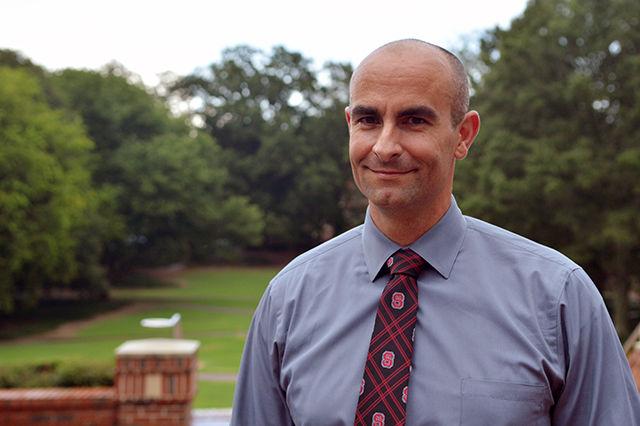Every path to NC State differs, but dealing with addiction or living among it makes for a bumpy road. With an encouraging environment, one can thrive and get back on track. Such is true for Jesse Bennett, a junior studying social work.
After a spell of homelessness, the Wilmington native set foot in Raleigh. Finding consolation in Healing Transitions, a service for substance abuse treatment, Bennett enrolled at Wake Technical Community College. David Fitzpatrick, an NC State social work professor and current chair of Healing Transitions, recommended he transfer to NC State’s Department of Social Work.
At first, sitting amid younger students was strange for Bennett, but he eventually fell into the role.
“When I first started back to school at Wake Tech, there were young and old students, so I was in the transition coming over here,” Bennett said. “The social work department here has been one of my biggest advocates and cheerleaders. Some students look up to me because of my experience I lived through.”
In the long run, he seeks to pursue a Master of Social Work.
“I either want to work in social work policy or with individuals who are in treatment or need recovery supports and supporting individuals coming out of incarceration,” Bennett said.
Since May, Bennett has been counseling men and women at Healing Transitions, many of whom are facing similar instances of adversity.
“It’s a peer-run program,” Bennett said. “I do a lot of case management; I deal with the individuals who are trying to transition. We’re trying to get them to secure things like housing, jobs, etc.”
For those still healing, temptation may triumph resistance. Bennett also works with the NC Harm Reduction Coalition, which assesses individuals’ situations as they currently stand, limiting risks associated with drug use, sex, diseases, etc. and preventing overdose.
While not working or taking classes, Bennett spends time with his wife and 14-month-old boy, who will soon have a baby sister.
“Time management and finding that balance has been hard, but I have a big support group,” Bennett said.
Moreover, Bennett is the president of the Collegiate Recovery Community at NC State.
“We help students who are in recovery from substances or who might have had an incident during their college career and need support,” Bennett said. “This includes individuals who are trying to transition from community college to NC State and need assistance in the process of getting into the university. It can be a little daunting sometimes.”
The organization is for anyone who wishes to steer away from addictive behavior, be it eating, social media, drugs, etc. Of note, those lacking an addiction are heartily encouraged to join, as they mitigate the traditionally taxing process of healing.
“Maybe you want to go to the Counseling Center but you don’t want to cross that path by yourself. People in collegiate recovery would love to walk that path with you to any support system.”
When input is in need, it’s not unusual for students to gravitate toward their peers.
“If you think something is happening and feel like you need to talk to somebody, reach out,” Bennett said. “Don’t think everything is going to get better, because sometimes it doesn’t. Reaching out and talking to other students who are going through the same things, in my experience is a big relief.”
Alumni Chris Campau and Scott Luetgenau originally started the College Recovery Community in 2014. Bennett met Campau while he was a client at Healing Transitions and helped him transition to NC State with ease.
“I feel like a lot of people on college campuses have something that they’re not comfortable talking about, but if they were to talk about it, they’d find out how many people had a similar experience,” Campau said. “It’s a healthy environment for conversation.”
Leaving Western Carolina University with a low grade point average, Campau successfully recovered from his addiction. After initially being denied admission at NC State, Campau started taking non-degree courses to prove he was capable of the coursework.
“In the meantime, I started calling other colleges that had collegiate recovery programs. I went to a conference down at Texas Tech University,” Campau said. “I met all of these people from universities who said they would not only accept me immediately, but also give me full or partial scholarships and waive out-of-state tuition.
With an established life in Raleigh, he was unable to make the move.
“I started building the collegiate recovery while I was still a non-degree and all of the awesome people I had met wrote letters to the board of admissions,” Campau said. “They accepted me in the spring of 2013.”
In a college atmosphere, drugs and alcohol are prone to entice. Sifting through a sea of tailgaters in search of sobriety may prove difficult. The organization orchestrates sober tailgates for noteworthy games and also collaborates with other collegiate recovery programs.
Collegiate recovery programs exist countrywide, yet their presence falls short in community colleges. According to Campau, expansions are in the works; Nash Community College has a program and Central Piedmont recently received a grant for one. Locally, in the meantime, Wake Tech students are advised to fraternize with NC State’s platform.
“[UNC-Chapel Hill] has a traditional collegiate recovery with a paid staff, with people coming through admissions through their program, but that’s not how it is here,” Bennett said. “My goal for collegiate recovery is to secure funding and make it a full collegiate recovery program that has support from the Counseling Center, students, faculty members, etc. We’re getting there, but were not there yet.”
On Oct. 14-15, the 3rd Annual Mid-Atlantic Collegiate Recovery Conference will be held in the McKimmon Center.
“The strength of the wolf is the pack and the strength of the pack is the wolf,” Campau said. “I’ve always believed that if you’re struggling, find your pack. If you don’t have the ability to support yourself right now, allow to pack to surround you and support you.”








